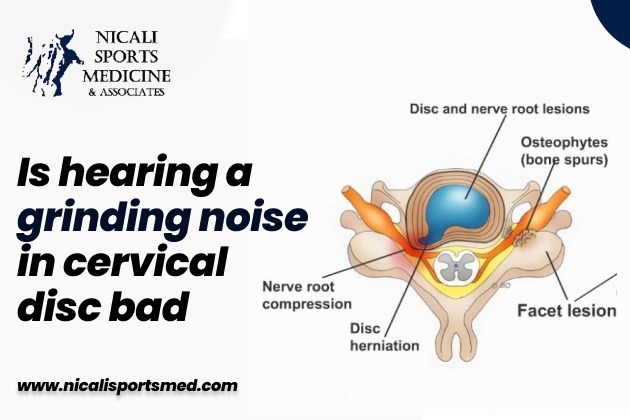When you turn your head, have you heard anything distinctly grinding or a crunch in your neck? You are not by yourself! Many people get similar symptoms, sometimes known as crepitus neck, and it makes sense to be worried. Is the problem serious? What is triggering this? Specifically, should you take action?
Move your head and have you heard grinding or a crunch in your neck? You’re among wise company. Often referred to as neck crepitus, these feelings are experienced by many people and cause frequent worry. Still, the fundamental concern is whether a grinding noise in the cervical disc is harmful, or is neck crepitus dangerous? Allow us to examine!
This article will define crepitus neck, its typical causes, and whether it is hazardous. It will also offer doable advice for either controlling or avoiding the problem. If you’ve been wondering, “Is hearing a grinding noise in the cervical disc bad?” Now we have the answer. We have you covered.
What Is Neck Crepitus?
Crepitus is a medical term more commonly known as the cringe-worthy grinding, popping, or crunching sound joints often make when they move. You generally notice these sounds when you move your head or stretch your neck. This symptom happens in the neck, also known as crepitus neck. Though these sounds can be scary, the truth is they’re almost always benign.
Comprising vertebrae, cartilage, ligaments, and muscles allowing flexibility, the cervical spine—that is, the neck area of your spine—is a complicated system. Especially during movement, its close-packed anatomy makes sensation and sound more apparent.
Many people describe their necks as “crunchy,” or note that neck crunching when turning head. Still, people might question, “Is hearing a grinding noise in cervical disc bad?” Continue reading to learn why these sounds occur and when action is necessary. Read more for a closer look at how to get rid of crunching sound in neck.
Why Does Neck Crepitus Occur?
Does your neck seem to be performing a symphony of clicks and pops? The following four are the most commonly occurring causes of these crunchy neck sounds:
1. Gas Bubbles in Synovial Fluid
Synovial fluid—which includes nitrogen gas—cushions the tiny joints in your neck. Moving your neck alters the pressure in the fluid, which causes these bubbles to collapse and produces loud “pops” or grinding. These sounds are benign and like knuckles cracking.
2. Arthritis
The cartilage between your joints can wear down due to age or conditions like osteoarthritis. This causes friction and grinding on the surface of the vertebrae, causing the crunching noise in the neck. If that’s you, you might want to check out our full blog post on how arthritis can affect your neck.
3. Misalignment of Vertebrae
Misaligned cervical vertebrae can produce aberrant pressure on the surrounding structures, which can induce grinding or neck clicking near the base of skull. Often times, this is accompanied by stiffness or pain.
4. Tendons and Ligaments
Often described as a neck crunching sensation when turning the head, the tendons or ligaments in your cervical spine may snap over bony structures during movement. If your muscles tense from stress or bad posture, this is more likely.
Is Hearing a Grinding Noise in Cervical Disc Bad?
Still unresolved is the major question, “Is neck crepitus dangerous?”, “Is hearing a grinding noise in the cervical disc bad” The good news is that usually it is not. Many people without any underlying medical problems find their neck sounds crunchy. There are times, though, when these sounds could indicate something more severe.
When it’s Likely Harmless:
There is no associated pain or discomfort; neck movement feels natural and is not limited; the sounds happen sometimes and do not get worse with time.
When You Should Be Concerned:
A few symptoms could point to an underlying issue. Should you observe the following, pay close attention?
- Ongoing neck pain and cracking sounds.
- Grounding accompanied by arm weakness, numbness, or tingling.
- A crunching noise in the neck with stiffness or lack of motion.
- Radiating dizziness or discomfort.
See a doctor if you have any of these symptoms and find yourself asking, “Is hearing a grinding noise in the cervical disc bad?” Disorders such as cervical instability, ruptured discs, or arthritis could call for treatment.
The offenders could include disorders including herniated discs, cervical instability, or persistent arthritis. Should you be worried, see a medical practitioner for an assessment. Often employed to rule out major problems are diagnostic technologies, including X-rays, MRIs, and CT scans.
How to Get Rid of Crunching Sounds in the Neck
Should you be wondering, “How can I get rid of the crunching sound in my neck?” The following suggestions might help control or minimize the problem:
Exercise and Stretching
Mild stretching of the neck can help you with flexibility while minimizing stiffness. Such activities can involve moving your head very slowly from side to side or slightly turning it in a circle. A physical therapist can suggest appropriate stretches for your situation.
Posture Corrections
Correct posture for daily activities, sleep, and work helps avoid neck crunching when turning head. Keep your computer monitor at eye level and steer clear of “tech neck” brought on by extended down-looking at your phone.
Muscle Strengthening
By strengthening the muscles supporting your neck, you may reduce crepitus and stabilize the cervical spine. Frequent workouts aimed at the neck and shoulders can really change things.
Proper Hydration and Nutrition
By hydrating, you keep your spinal discs healthy and nourished. Combine with a diet high in calcium, magnesium, and omega-3 fatty acids to promote joint health.
Professional Therapy
Manual therapy or realignment—hands-on treatments offered by physiotherapists and chiropractors—may help reduce ongoing neck clicking at the base of skull. Seek expert advice always to prevent aggravation of symptoms.
When Should You See a Doctor?
Although most cases of crepitus are benign, you should see a doctor if the grinding sounds get worse over time.
- You may also get tingling, arm numbness, or weakness.
- You may feel terrible stiffness or pain, and even in the shoulder while moving.
Consulting an expert or medical professional helps you properly diagnose and treat potential problems such as herniated discs, osteoarthritis, or cervical instability.
How to Prevent Neck Crepitus
Starting a better lifestyle helps one prevent crunchy neck. The following describes
- Stay Active: Frequent exercise encourages a good cervical spine.
- Take breaks from technology: Minimize the stress brought on by extended screen usage.
- Use Ergonomic Support: Make sure your workstation helps you maintain good posture.
- Listen to your body: Treat minor symptoms before they become more severe.
Debunking Myths about Crunchy Neck Sounds
Many legends surround the crunch sound in neck. The fact is just like this.
- Not every neck crepitus is threatening. Unless accompanied by concerning symptoms, most occurrences are benign.
- Not always do neck sounds indicate your neck is “out of place.” Usually, it is only soft tissue snapping or gas bubbles.
Caring for Your Neck Health
To sum it up, is hearing a grinding noise in cervical disc bad? Is neck crepitus dangerous? Usually, no. The vast majority of cases of crepitus neck are benign and don’t require medical attention. But if you are in pain or feel stiffness or any other troubling symptoms, don’t hesitate to ask a healthcare professional for help.
Be proactive about caring for your cervical spine and do not ignore constant concerns. If you’d like to learn more about how to keep your neck healthy, here’s our comprehensive blog on Why does my neck crack so much?.
To keep your neck from cracking, it is advisable to seek a licensed chiropractor with positive reviews and ask questions when you consult him.
Visit and schedule a consultation with Nicali Sports Medicine & Associates. The results are only one appointment away! Today, take care of your neck; tomorrow, you will see a wider range of motion!

